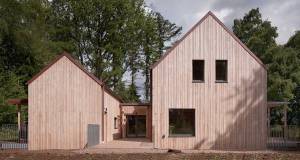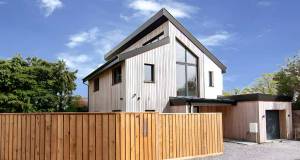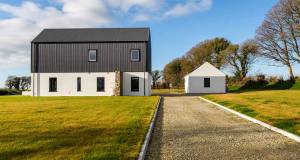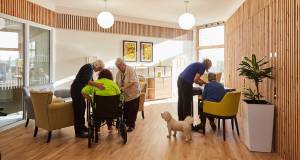News
POLL: UK public detached from net zero goals
A survey of 1,500 UK homeowners by the Social Market Foundation (SMF) – a cross-party think tank – has revealed government failure to make people feel confident in taking steps for the net zero transition, jeopardising its success.
Wales unveils net zero pattern book
Wales’s devolved government has moved forward with plans to standardise sustainable, timber-based affordable homes in the country with the publication of a new pattern book.
Scotland to accept passive house as regs compliant
Certified passive house to be alternative means of compliance to proposed Scottish passive house equivalent.
Green homes key to climate and housing crises and rebuilding Ukraine
The Smarter Finance for EU consortium, which is aiming to unlock €100bn worth of green homes across Europe, announced the launch of a European centre of excellence to promote green home certification and investment across Europe at the Irish Green Building Council’s annual residential conference in Dublin.
Plain English book tells story of embodied carbon
Canadian green building writer and architect Lloyd Alter has published a book to explain the importance of embodied carbon in simple terms.
70 per cent grants for passive house training
There may never be a better time for companies to upskill their staff in passive house, Enerphit and net zero construction – thanks to new 70 per cent grants.
Pilot UK net zero carbon buildings standard launched
A pilot version of the UK’s first cross-industry standard for net zero carbon-aligned buildings has been launched.
Green homes a “multi-trillion euros opportunity” – but greenwashing must end
Europe’s burgeoning green homes market is a multi-trillion euros opportunity – but lenders must be wary of facilitating greenwashing, a pan-European consortium has warned.
Study: gas cooking killing 40,000 Europeans per year
Gas cooking is killing 40,000 European people a year in Europe, a major new study has revealed, with an average of almost two years taken off their life in the EU and United Kingdom due to exposure to nitrogen dioxide (NO2) emitted during gas cooking.The countries with the highest burden were Italy, Poland, Romania, France and the UK.
£30m passive scheme launched in Down
Multi-award winning Belfast-based property developer, Fraser Millar, has launched Northern Ireland’s second large-scale residential passive house development – a 74-unit scheme of detached and semi-detached homes at a total project value of £30m.
Unilin appoints new general manager for the UK and Ireland
Aidan Doyle has joined insulation manufacturer, Unilin Insulation, as General Manager for both the Ireland and UK businesses.
High performance buildings essential for climate and quality of life
The en masse global shift to high performance buildings is essential to meeting the climate challenge and improving quality of life around the world, an international conference has heard.
St Albans passive house scheme launches, promising luxury and energy income
Home buyers seeking sustainable luxury and energy income in a sought-after part of England have a rare opportunity with a newly launched passive house scheme in St Albans.
Scotland committed to continuing passive house journey
Patrick Harvie MSP, the Scottish government’s minister for zero carbon buildings, active travel and tenants' rights, was a keynote speaker at the UK Passivhaus Conference in Edinburgh on 17 October, and shared his vision for energy efficient and low carbon buildings in Scotland.
AECB conference 2023: from edible landscaping to whole life carbon
Delegates at the 2023 AECB Conference heard a wide range of speakers covering everything from guerrilla edible planting to peak oil to detailed discussions on whole life carbon calculation.
Free programme to bring passive house to UK architecture students
A new free-to-access training programme, Design Performance for Climate Action, provides architecture students across the UK with a solid foundation in climate-responsive building design – with passive house at its core.
Sustainable bodies criticise Future Homes lack of ambition
Three leading sustainable building organisations have expressed disappointment with the government’s proposed Future Homes Standard, which went to consultation in December, along with proposals for non-domestic buildings.
AECB conference: building, climate chaos and biodiversity collapse
The AECB 2023 Conference will focus on providing solutions required for building in an age of climate chaos and biodiversity collapse.
Design and performance centre stage at UK Passivhaus Awards
A pioneering co-housing scheme, a cube-shaped self build, a cork and polyester- insulated retrofit to a 1970s house, a glulam timber school, and a curved college building were the winners at the 2023 UK Passivhaus Awards.
UN pushes for radical sustainable building action
The United Nations is pushing for a rapid drive to make the world’s buildings sustainable – aided by an international coalition centred in the Wexford town of Enniscorthy.
New Licence Plus scheme undermines retrofit standards, experts say
TrustMark defends scheme & says it creates a pathway to PAS 2035
Show Me the Bodies: How We Let Grenfell Happen
Simon Jones reviews new book exploring the Grenfell tragedy.
Scotland to mandate passive house for new homes
Scotland’s minister for zero carbon buildings is proposing to make the passive house standard, or a new Scottish equivalent, the minimum energy efficiency standard for new build homes from the end of 2024.
Must listen: Zero Ambitions Podcast
Over the past two years Passive House Plus editor Jeff Colley has been moonlighting as co-host of Zero Ambitions, a weekly podcast that wrestles with the challenge of how to deliver the scale and ambition of decarbonisation and sustainability in buildings required to avoid a hellish future.
Building or upgrading?
If you’re pricing, designing or constructing a building – whether it's an energy upgrade of a small house or a sustainable new build home, office or multi unit scheme – Passive House Plus can help.
Click here to get in contact with the companies you need, and receive a copy of Passive House Plus for free!
Marketplace

Ecocem venture may speed up EU cement decarbonisation by a decade
Green cement pioneer Ecocem has announced the construction of its first production facility dedicated to ACT, its low carbon, globally scalable cement technology, at its Dunkirk site.
11-03-2025 Marketplace
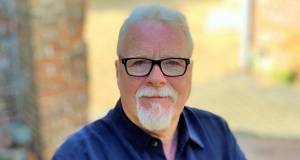
Ecomerchant founder announces new green podcast
A new podcast dedicated to longform interviews with leaders in the natural building sector will be launched this year.
11-03-2025 Marketplace
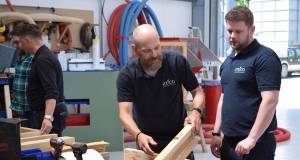
We Build Eco sees growth in people wanting to build eco the easy way
Interest in flat pack bio-based building is growing, according to We Build Eco, which creates easy to assemble, energy efficient building kits manufactured from any design.
11-03-2025 Marketplace
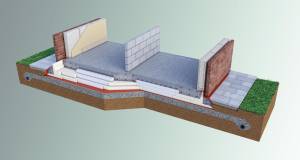
Insulated foundation system greenlit by BBA
Kore Insulation has received the stamp of approval for the Kore Insulated Foundation System from the UK’s construction product certification body, the British Board of Agrément (BBA).
11-03-2025 Marketplace
Passive EcoWall from Ecological Building systems cuts whole life carbon
The construction industry can drive down embodied carbon emissions while achieving best practice energy performance - using a tried and tested solution from one of the UK’s pioneering green building…
Grant launches new generation “game-changer” heat pump
Leading heating technology manufacturer Grant has announced the launch of its next generation air source heat pump – the Grant Aerona 290, which is now available to order.
Lung disease patient: Zehnder MVHR “the best thing I’ve ever had”
A Scottish lung disease patient has credited a Zehnder heat recovery ventilation system with causing such a significant improvement in his respiratory health that he’s been taken off a lung transplant list.
Proctor creates head of global sales for modular offsite sector
A. Proctor Group has announced the promotion of Adam Salt to the position of head of global sales modular offsite, effective immediately.
Why airtightness, moisture and ventilation matter for passive house
Ecological Building Systems technical specification advisor Dave Judd looks at airtightness, active moisture control and effective ventilation in passive house properties.
Ireland’s first 3D printed homes insulated with clay foam
Ireland’s first 3D printed housing project has been delivered in Dundalk – integrating Firetite aerated clay cavity wall insulation.
Sisk-led consortium secures £500,000 fund from Innovate UK
Sisk, in collaboration with a consortium of leading low carbon industry experts, has announced that it has been successful in securing £500,000 from Innovate UK funding as part of the…
Ecocem appoints new UK and Ireland MD
Ecocem, Europe’s leading provider of low carbon cement technologies, has today announced the appointment of Sally Anne Sherry as managing director for its UK and Ireland business operations. In this…
New tool to ease certification of smaller passive schemes
Passive house certification for smaller scale projects just got substantially simpler – thanks to a new software tool launched by the Passive House Institute.
MgO boards to disrupt construction industry, report claims
Magnesium oxide (MgO) boards are poised to “disrupt” the construction industry, a new white paper has claimed – meaning products like Cem-Rock from Limerickbased supplier Greenspan may be poised for widespread adoption.
Unilin UK launches embodied carbon report
Leading insulation manufacturer Unilin has produced a report on calculating and reducing embodied carbon while using the company’s products.
Zehnder launches MVHR system for tight spaces
Zehnder Group UK has launched the Zehnder ComfoAir Flex – a mechanical ventilation system with heat recovery (MVHR) specifically designed for tight spaces and challenging installation environments.
Tackling UK carbon emissions with Passive Ecowall
Carbon emissions originating from the construction and operation of buildings in the UK constitute a sizeable portion of the country’s overall emissions, amounting to 40 per cent.
Beattie Passive appoints self-build manager
Passive house pioneer and offsite modular construction specialist Beattie Passive is delighted to announce the appointment of Simon Clarke to the newly created role of client solutions manager.
Partel launches paper-based membranes
Galway-based sustainable building product supplier Partel has launched two new paper-based membrane products, Izoperm Plus Eco and Vara Plus Eco.
Beattie Passive announces appointments
Passive house pioneer and modular construction specialist Beattie Passive has made a series of appointments to strengthen its project management, HR, and architectural design teams.
- 1
- 2
- 3
- 4
From the magazine
Blogs
Passive house doesn't care about materials
One stubborn trope in some corners of green building is that passive house is so focused on energy performance that its advocates ignoring materials. Not so, argues Toby Cambray.

We need to talk about women and retrofit
Our efforts to retrofit homes across the UK and Ireland will be severely hampered unless we engage meaningfully with and empower women homeowners and professionals, writes Ellora Coupe, founder of Her Retrofit Space.

If passive house is Everest, we’ve left base camp
The construction industry is moving in great numbers towards the passive house standard. In an adapted version of a speech at the Construction Industry Federation Conference in September, Passive House Association of Ireland chair Caroline Ashe Brady looks at the trek ahead.
In defense of fabric
As the grid gets greener and the case for heat pumps as a decarbonisation silver bullet becomes increasingly compelling, questions are starting to be asked about how far we need to go with retrofitting building fabric – or whether we need improve fabric at all. We ignore fabric at our peril, warns Toby Cambray.

Out of the blue - a passive revolution
Near the peak of the Celtic Tiger – at a time when developers were throwing up often sub-standard homes at a record pace, one self-build project pointed to a different approach, writes Dr Marc Ó Riain.

Buy, hold or sell
Recent analysis has suggested a slowdown in the property sector for 2024, but what impact might a drop in inflation have? Mel Reynolds runs the numbers.
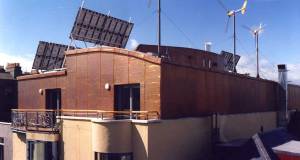
An early green building in a changing Ireland
It’s fair to say that green building wasn’t a thing in early 90s Ireland, which makes one extraordinary Dublin project from 1994 all the more remarkable, as Dr. Marc O Riain writes.
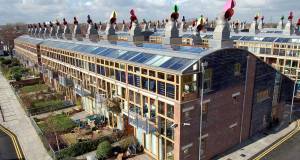
Bedding sustainability into British buildings: Bioregional’s BedZed
Shortlisted for the Stirling Prize in 2003, BedZed was a prominent example of architecture starting to pay attention to sustainability. But how well did it work? In the latest part of his series on the history of low energy architecture, Dr. Marc O Riain looks back at a landmark project.
Awaab Ishak’s death shows that building physics are a life and death matter
Advances in building physics in recent years are leading to an ever-increasing understanding among experts of the risks that a litany of pollutants can pose to building occupants. But this has not stopped vulnerable people from living – and dying - in substandard buildings that exacerbate these risks. Urgent action is needed, Toby Cambray explains, to better communicate and decisively tackle the risks buildings can pose to their occupants.
Mainstreaming retrofit – a massive missed opportunity
The scale of the retrofit challenge facing the UK and Ireland will require an army of tradespeople to upgrade homes – leading many to the conclusion that a new retrofit industry needs to be built from scratch. But is a more realistic answer staring us in the face – a thriving existing industry of trusted local tradespeople, asks Dr Catrin Maby OBE.
Does nuclear have a role to play in decarbonising energy?
One zero carbon energy source has historically been vehemently opposed by environmentalists. But can nuclear power overcome the high-profile failures of its past, asks Dr. Marc O Riain, or has the technology missed the boat?
Is it okay to retrofit heat pumps before building fabric?
How flexible can heat pumps be to handle what may be inexactly defined heating demands, asks Toby Cambray?
The PH+ guides
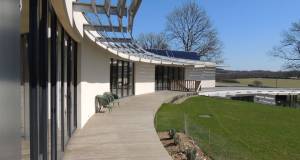
The PH+ guide to insulating concrete formwork
As demand for super-insulated and airtight building structures grows, insulating concrete formwork (ICF) is rapidly gaining popularity as a method of construction. But what exactly is ICF, what are its key advantages, and why is it so well suited to passive house and low energy construction?
16-10-2018 Guides
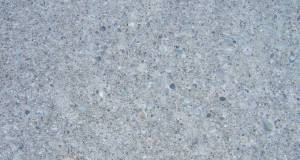
The PH+ guide to greener concrete - reducing the climate impact of cement and concrete in buildings
Cement is responsible for up to 8% of global carbon emissions, and in this guide, sustainable design expert Jay Stuart looks at ways to minimise its environmental impact through good design, and at some of the alternative, lower carbon cement and concrete products on the market.
30-07-2020 Guides
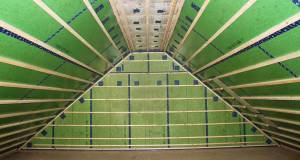
The PH+ guide to airtightness
Once poorly understood by the mainstream building industry, airtightness is now increasingly seen as one of the most crucial objectives on any building project. Not only is it vital for energy efficiency, it’s also key for thermal comfort and for protecting a building’s structure from dampness and mould. In this comprehensive guide to airtightness, we look at why it’s so important, how exactly it’s measured, and most importantly, how to achieve it on site.
04-02-2019 Guides
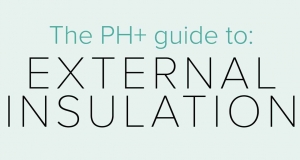
The PH+ guide to external insulation
In the first in a new series of technical articles on some of the key technologies in sustainable building, John Hearne makes the case for wrapping buildings in an external insulation layer, and describes some of the main issues to watch out for.
07-02-2018 Guides




